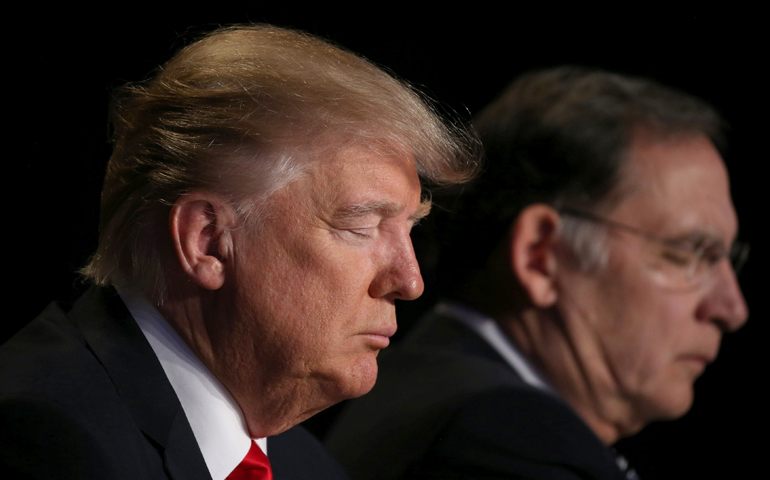
President Donald Trump prays during the National Prayer Breakfast Feb. 2 in Washington. (CNS/Carlos Barria, Reuters)
Tall tales. Untruths. Fibs. Falsehoods. Fallacies. Deceptions. Prevarications. Puffery.
Disambiguation. Perjury. Verbal dishonesty. Spin. Obfuscations. Disinformation. Bunkum. Hokum. Whoppers.
Let's keep tallying the words by which we perfume the language to avoid the stench that comes with the word "lie." It's harsh, an absolute — not soft like fibbing or spinning. In Donald Trump, who is addicted to the phrase "believe me," the country is now stuck with a serial liar as president.
Before successfully conning much of the public into seeing his dishonesty as not especially troubling, and surely not a character defect that should cause an electoral loss, Trump himself was a serial accuser of rivals for their deceits. Beware "Lyin' Ted Cruz," he warned the voters, and the "even bigger liar" Marco Rubio, along with Ben Carson, a "pathological liar," now the 17th secretary of housing and urban development.
Where polygraph tests were once how cops, prosecutors and the FBI nabbed lying criminals by measuring heartbeats, blood pressure and respiration, now it's media fact-checkers having their day. Politico examined 4.6 hours of Trump's speeches and found an average of one lie every five minutes. At one town hall event, The Huffington Post reported "71 separate instances in which Trump made a claim that was inaccurate, misleading or deeply questionable."
All that from someone who, soaring beyond cheek, damns reporters as "the most dishonest people on earth." In a post-election meeting with TV executives and anchors, Trump was reported to have ranted "We're in a room of liars, the deceitful, dishonest media who got it all wrong."
Trump's disdain for those he sees as veracity deficient, and therefore his enemies, is a mindset that philosopher Sissela Bok ably analyzed in her 1978 book, Lying: Moral Choice in Public and Private Life: "Liars share with those they deceive the desire not to be deceived. As a result, their choice to lie is one which they would like to reserve for themselves while insisting that others be honest. They would prefer, in other words, a 'free-rider' status, giving them the benefits of lying without the risks of being lied to."
At The Washington Post, full-time fact-checker Glenn Kessler awards from one to four long-nosed Pinocchios to fork-tongued politicians, with the severest lie earning four. Trump, Kessler reported, "has amassed such a collection of Four-Pinocchio ratings — 59 in all — that by himself he's earned as many in this campaign as all other Republicans (or Democrats) combined in the past three years." In the first week of the Trump presidency, Kessler recorded 24 statements that ranged from sloppy thinking to direct lies, not including dubious claims in the inauguration speech.
As overworked as this fact-checker and similar truthers may be, what's needed is more direct call-outs, of which there is a precedent of sorts. When President Barack Obama spoke about healthcare reforms to a joint session of Congress in September 2009, he said illegal immigrants won't be insured, and Joe Wilson, a South Carolina Republican shouted, "You lie!"
Why can't the media do the same when Trump runs off at the mouth? Isn't it time at a White House press conference to ask the obvious questions: "Mr. President, why have you lied repeatedly? Why have you never admitted to lying? Why have you never apologized to those you harmed by your lies? Why do you have contempt for the truth?"
Disrespectful? It would be if Trump, a hateful bigot forever blowing hot air to further inflate his billowing ego, had ever done anything to earn respect. Seemingly aware of his compulsions, he pledged at a campaign stop in April: "At some point, I'm gonna be so presidential that you people will be bored." At another rally: "When I'm president, I'm a different person."
Turns out these were talking points for the base — or lying points. From falsifying the crowd count at his inauguration to the swipe at "the so-called judge," Trump has not trumped himself.
Nothing was presidential in his Feb. 16 White House press conference. He was typically combative, petty, rambling, hostile and self-absorbed. It was easy pickings for the fact-checkers, starting with Trump's deceit that he had "the biggest electoral college win since Ronald Reagan." When called on it by a reporter, that in fact he had a smaller electoral percentage than the last three presidents in five elections, he said lamely "I've seen that information around." It was a moment to say, "I'm mistaken, I'm sorry."
That would have taken spine, of which Trump has none.
[Colman McCarthy directs the Center for Teaching Peace in Washington, D.C. His books include Teaching Peace: Students Exchange Letters With Their Teacher.]


